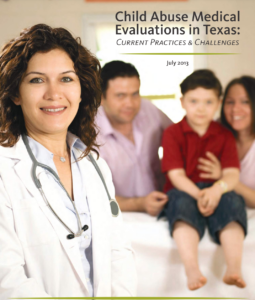Child Abuse Medical Evaluations in Texas: Current Practices & Challenges.
 The Texas Institute for Child & Family Wellbeing (TXICFW) conducted a mixed methods study on child abuse medical evaluations in Texas. This report offers findings from the study, which was contracted by the Children’s Advocacy Centers of Texas (CACTX).
The Texas Institute for Child & Family Wellbeing (TXICFW) conducted a mixed methods study on child abuse medical evaluations in Texas. This report offers findings from the study, which was contracted by the Children’s Advocacy Centers of Texas (CACTX).
When someone reports an allegation of child abuse, children should receive child abuse medical evaluations for both medical and forensic purposes. A 2011 report by the Midwest Regional Children’s Advocacy Center found that nationally, 34% of children referred to a non-profit children’s advocacy center receive a medical evaluation. However, the CACTX found that, in Texas, only 21% of children with alleged abuse receive medical evaluations. These results were even lower rates in smaller communities and rural areas. As a result, CACTX identified a need to research existing policies about and barriers to children receiving medical evaluations.
TXICFW researchers conducted a mixed methods study in two parts. The first part of the study consisted of 60 focus group interviews of multidisciplinary team (MDT) members in 12 localities. Researchers chose the localities using two criteria:
- Community size (e.g. small/rural, mid-sized, and large/urban centers).
- Rates of medical evaluations in the locality (either higher or lower than localities of similar sizes).
Researchers used the focus group interviews to explore existing practices for evaluations in alleged child abuse cases. In addition, researchers explored barriers to evaluations and possible strategies to increase evaluation rates. The second part of this study used the initial focus group findings to develop and distribute an online survey statewide to all MDT members. Over 300 MDT members completed the survey. The research was conducted between October 2012 and June 2013.
Findings
Results suggest multiple barriers to child abuse victims receiving proper medical evaluations. Findings document the processes of obtaining medical evaluations for children, factors that impact whether a medical evaluation is completed, and the functioning of MDTs. Complex issues related to children obtaining evaluations include the following:
- Lack of medical professionals with child maltreatment specializations.
- Complicated reimbursement structures.
- Factors related to a child’s outcry.
- The child and the child’s family.
- Community factors such as the proximity to specialized services.
Finally, MDT functioning, collaboration, and understanding between team members impacts the processes of referrals for medical evaluations.
Read the report:
Child Abuse Medical Evaluations in Texas: Current Practices & Challenges
Suggested Citation: Faulkner, M., Rivaux, S. L. & Marra, L. (2013). Child Abuse Medical Evaluations in Texas: Current Practices & Challenges. Austin, TX: Children’s Advocacy Centers of Texas.
